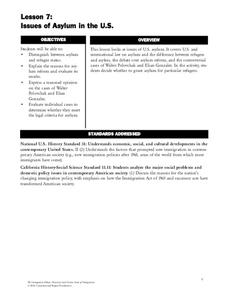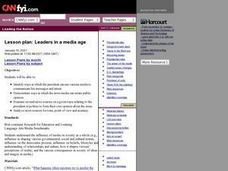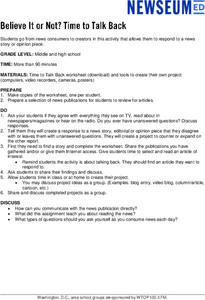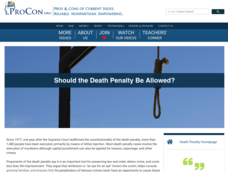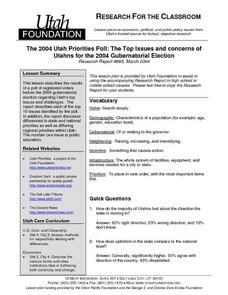Curated OER
Who Could Have Been Who
Can word choice affect a candidate's likeability? Use a New York Times lesson to explore how a presidential candidate's likeability factor can fluctuate in public opinion polls. Young readers choose a presidential election from their...
EngageNY
Final Performance Task: Delivering an Opinion Speech with Multimedia Display
Welcome to the grand finale! Scholars practice reading their speeches to a partner and make last-minute changes based on feedback. Pupils then present their final opinion speeches to their small groups and show off their work in a...
Curated OER
Persuasive/Argumentative Essay vs. Opinion writing
Reinforce persuasive and argumentative writing skills with this instructional activity, which utilizes SchoolNet News Network's website/SNN Monthly magazine. Young writers review journalism writing styles that help them explain that...
Curated OER
Promises, Promises
If someone breaks a promise, is that person no longer trustworthy? Present your 6th and 7th graders with a series of statements and have them debate their opinions with supporting evidence. As an extension, have your students write a...
Constitutional Rights Foundation
Issues of Asylum in the U.S.
Who gets to come to the United States? Examine cases of individuals seeking asylum with an informative reading passage that includes examples, statistics, and representations of public opinion regarding asylum. Groups then go on to...
Newseum
Weighing the Arguments
To understand how personal perspectives can affect policy and politics, scholars examine the woman suffrage media map and historical artifacts to analyze arguments for and against women's suffrage. Class members then take on the role of...
Curated OER
Health Education: Opinions
Third graders consider the opinions of others. In this personal health lesson plan, 3rd graders demonstrate how to effectively and respectfully express opinions that differ from others as they create and follow rules for productive...
Curated OER
Private or Public? Public Goods and Services
In this Private or Public worksheet, students read about the role our government plays in economics, then answer several questions including voicing their opinions about what should (not) be paid for by the government.
Curated OER
Branding and Brand Names
To examine advertising and expressing opinions, learners create an original brand or product. They rank their favorite brands and discuss what they like or do not like about the brands, following a brand name investigation. This...
Curated OER
Forensic Colloquium Experience: Debating the Issues
Pupils prepare for an participate in a debate. They watch instructional videos on how debates proceed. Pupils work in teams to research various topics, present their opinions on the issue, and respond to opposing viewpoints during a...
Curated OER
Leaders in a Media Age
Students identify ways in which the president can use various media to communicate his messages and intent. They demonstrate ways in which the news media can create public opinion.
Curated OER
Your Right to an Attorney
An outstanding instructional activity on a person's right to have attorney's representation in a court case is here for your young learners of the law. Pupils read a lengthy account that spells out the laws regarding legal...
University of Wisconsin
Analyzing Presidential Campaign Propaganda
Campaign propaganda has evolved from 1952 through the presidential election of 2008. A social studies activity prompts class members to analyze the devices used in ads and political cartoons, noting strategies they believe would work to...
Library of Congress
The Emancipation Proclamation and the Thirteenth Amendment
How did the Emancipation Proclamation lead to the Thirteenth Amendment? Middle schoolers analyze primary source documents including the text of the Emancipation Proclamation, political cartoons, photographs, and prints to understand the...
New York City Department of Education
Grade 5 Literacy: TCRWP Nonfiction Reading and Opinion/Argument Writing
Choose a side! Pupils watch and read several nonfiction resources about zoos. After gathering their research, they choose a side either for or against closing zoos. Scholars complete KWL charts, anticipation guides, flow charts, and...
Newseum
Believe It or Not? Time to Talk Back
Young journalists select a news story, editorial, or opinion piece that they disagree with or one that leaves them with questions. They then create their report in response and share it with the class.
ProCon
Death Penalty
Should the United States continue the practice of capital punishment? Scholars set out to answer the question in preparation for a class debate or discussion about the death penalty. They watch videos, analyze charts about death penalty...
Curated OER
The 2004 Utah Priorities Poll
Students participate in a lesson that focuses on a state survey for Utah. The survey is intended to find the public opinion of how the state is doing in the public eye. They analyze the survey and create their own to research the status...
State Bar of Texas
Tinker v. Des Moines
Freedom of speech allows anyone, even those in school, to say and do what they feel—right? The 1969 Supreme Court case Tinker v. Des Moines serves as the backdrop for a study on First Amendment rights. Scholars use a short video along...
Curated OER
Where Do You Stand?
Scholars assess a government's ability to intervene in personal health decisions. They research basic facts about euthanasia and describe their opinions about new legislation passed in the United States Congress about an individual's...
Curated OER
The Civil War: A Nation Divided
Discuss the differences between the North and the South and how those differences led to the Civil War. Middle schoolers examine and analyze a famous speech or writing by President Lincoln in order to better understand the speaker's...
Curated OER
Making a Case
Start the day by sharing opinions about human rights. Then, read "A Defiant Hussein Pleads Not Guilty to Mass Execution" with your middle and high school class. Your pupils research the specific charges in the case against Saddam...
Curated OER
Noteworthy?
Why do we have CliffsNotes? SparkNotes? Middle and high schoolers examine arguments for and against the recent influx of book notes, or study guides. They stage a debate in which they represent Advocates For or Critics Against the use of...
Curated OER
Conscience and Public Service
Students study conscientious observers (COs) in the Civilian Public Service (CPS) during World War II. They explore how the media sources influence public opinion and policy makers, and complete a writing assignment about the topic.
Other popular searches
- Public Opinion Polls
- Public Opinion Iraqi War
- Measuring Public Opinion
- Public Opinion Public Policy
- Public Opinion Polling
- Vietnam Public Opinion
- Government Public Opinion
- Public Opinion and Media
- Public Opinion War
- Mass Media and Public Opinion






